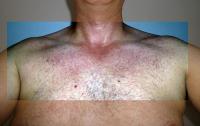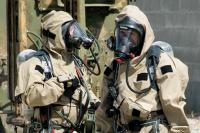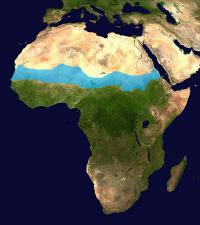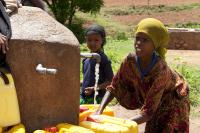-
Climate change to alter water flows in Africa's rivers, leads to cross-border water conflicts
Climate change could significantly alter water flows in major river basins in Africa, presenting a new barrier to nascent efforts to better manage water for food production and to resolve potential cross-border water conflicts all over southern Africa.
-
-
Efficient alternative for Ebola screening program for travelers
As of 31 January 2016, a total of 28,639 cases and 11,316 deaths have been attributed to Ebola, figures that are assumed to significantly underestimate the actual scope of the 2014 Ebola Hemorrhagic Fever outbreak in West Africa. In the United States, there were also two imported cases and two locally acquired cases reported in September-October 2014. Researchers offer an alternative policy for Ebola entry screening at airports in the United States. “Security measures implemented after 9/11 taught us a lot about what not to do,” one of the researchers say. “We learned that finding the one person who intends to do harm out of several million passengers is akin to finding a needle in a haystack.”
-
-
Ebola no longer a “Public Health Emergency of International Concern”: WHO
On Tuesday the WHO officials met to consider the Ebola virus disease (EVD) outbreak in West Africa, and to decide whether the event continues to constitute a Public Health Emergency of International Concern (PHEIC) and whether the current Temporary Recommendations should be extended, rescinded, or revised. WHOconcluded that Ebola transmission in West Africa no longer constitutes an extraordinary event, that the risk of international spread is now low, and that countries currently have the capacity to respond rapidly to new virus emergences. Accordingly, the Ebola situation in West Africa no longer constitutes a Public Health Emergency of International Concern, and the temporary recommendations adopted in response should now be terminated.
-
-
1.4 billion people face severe natural disaster risks in South Asia
New data has revealed that 1.4 billion people in South Asia, or 81 percent of the region’s population, are acutely exposed to at least one type of natural hazard and live in areas considered to have insufficient resources to cope with and rebound from an extreme event. Poor governance, weak infrastructure, and high levels of poverty and corruption amplify the economic and humanitarian losses associated with significant natural hazards events – and these factors will exacerbate the consequences of natural disasters especially in Africa, a continent which hosts eight out of the nine countries most vulnerable to natural hazards.
-
-
2015 made history with record heat, weather extremes: WMO
The year 2015 made history, with shattered temperature records, intense heatwaves, exceptional rainfall, devastating drought, and unusual tropical cyclone activity, according to the World Meteorological Organization. That record-breaking trend has continued in 2016. The global average surface temperature in 2015 broke all previous records by a wide margin, at about 0.76° Celsius above the 1961-1990 average because of a powerful El Niño and human-caused global warming. With 93 percent of excess heat stored in the oceans, ocean heat content down to 2,000 meters also hit a new record.
-
-
West Africa’s Ebola-affected countries face Zika threat

Rapid testing for the Zika virus is a critical need in the recent Ebola-affected countries of Liberia, Sierra Leone, and Guinea because of the recent Zika outbreak on nearby Cape Verde and the similarity in symptoms between Zika and early Ebola, experts say.
-
-
Global warming increases rainfall in world's driest areas

Global warming will increase rainfall in some of the world’s driest areas over land, with not only the wet getting wetter but the dry getting wetter as well — a phenomenon that could lead to more flash flooding.
-
-
EU, Liberian experts assess the country’s needs to mitigate CBRN threats

From March 7 to 9, Liberian and European Union specialists have gathered to proceed to the identification of needs in order to strengthen the country’s system to deal with threats emanating from Chemical, Biological, Radiological and Nuclear agents and materials.
-
-
AUC welcomes Ghana’s decision to introduce visa-on-arrival for AU states’ citizens

The Chairperson of the African Union Commission (AUC), Dr. Nkosazana Dlamini Zuma, has welcomed Ghana’s decision to introduce a visa-on-arrival policy for citizens of African Union Member States. The President of Ghana, H. E. John Dramani Mahama, announced the decision in his State of the Nations address to the Ghanaian Parliament on 25 February 2016.
-
-
Four African innovators selected for engineering innovation prize
Following an open, competitive, application process which saw entries from fifteen countries in sub-Saharan Africa, twelve African entrepreneurs were chosen to receive a package of six months of business training and mentoring from the U.K.’s Royal Academy of Engineering. The four finalists showing the greatest promise have now been chosen, and are in with a chance to become the overall winner. Each will receive at least £10,000 with the grand prize of £25,000 to be awarded at a ceremony in Cape Town on 1 June. A low-cost sustainable water filter system to provide clean and safe drinking water, and a service that allows African mobile phone users to switch easily between multiple mobile networks are among the four African innovations selected by the Academy.
-
-
Sahel youths susceptible to radicalization: UN envoy

Hiroute Guebre Sellassie, UN envoy to the Sahel region in Africa, said last week that up to forty-one million young people in the Sahel have nothing hut a bleak future to look to, pushing them to migrate and making them susceptible to radicalization. She said that young people under age 25 in Burkina Faso, Chad, Mali, Mauritania, and Niger “face hopelessness.” She noted that 44 percent of children in the Sahel lack access to primary education and only 36 percent of the population can read or write.
-
-
Climate change impact on food production could cause 500,000 extra deaths in 2050
Climate change could kill more than 500,000 adults in 2050 worldwide due to changes in diets and bodyweight from reduced crop productivity. The research, published yesterday in The Lancet, is the strongest evidence yet that climate change could have damaging consequences for food production and health worldwide. The study found that by 2050, reduced fruit and vegetable intake could cause twice as many deaths as under-nutrition, and that three-quarters of all climate-related deaths due to changes in food production are estimated to occur in China and India.
-
-
Water storage strategies in Sub-Sahara Africa

Direct abstraction of water from rivers through ponds and pumping devices seems the most attractive water storage option in Ethiopia. However, the funding agencies that may be interested in investing in such a storage system have to consider that better access to credit, and clear abstraction policies should be ensured.
-
-
French Special Forces join fight against ISIS in Libya
French Special Forces are among commando units operating on the ground in Libya against ISIS. A small French force has been operating out of Benghazi’s Benina airport, assisting forces of the internationally backed Libyan authorities in Tobruk. The Pentagon has said that in the absence of a unity government, U.S. Special Forces have been “partnering” with different militias for attacks on ISIS militants.
-
-
U.S. to fly armed drone attacks from a base in Sicily against ISIS in Libya

Italy said it would allow armed U.S. drones to be based in an American base in Sicily so they would be within to launch attacks against ISIS militants in Libya and other northern Africa countries. The agreement was reached after years of negotiations, and against the backdrop of intensified ISIS activity in Libya and other African countries.
-
- All
- Regional
- Water
- Biometrics
- Borders/Immig
- Business
- Cybersecurity
- Detection
- Disasters
- Government
- Infrastructure
- International
- Public health
- Public Safety
- Communication interoperabillity
- Emergency services
- Emergency medical services
- Fire
- First response
- IEDs
- Law Enforcement
- Law Enforcement Technology
- Military technology
- Nonlethal weapons
- Nuclear weapons
- Personal protection equipment
- Police
- Notification /alert systems
- Situational awareness
- Weapons systems
- Sci-Tech
- Sector Reports
- Surveillance
- Transportation
Advertising & Marketing: advertise@newswirepubs.com
Editorial: editor@newswirepubs.com
General: info@newswirepubs.com
2010-2011 © News Wire Publications, LLC News Wire Publications, LLC
220 Old Country Road | Suite 200 | Mineola | New York | 11501
Permissions and Policies
Editorial: editor@newswirepubs.com
General: info@newswirepubs.com
2010-2011 © News Wire Publications, LLC News Wire Publications, LLC
220 Old Country Road | Suite 200 | Mineola | New York | 11501
Permissions and Policies
